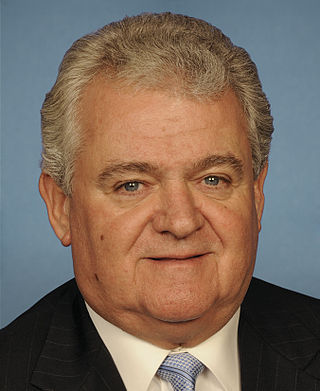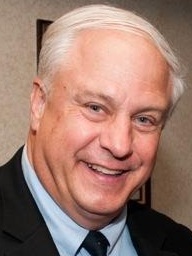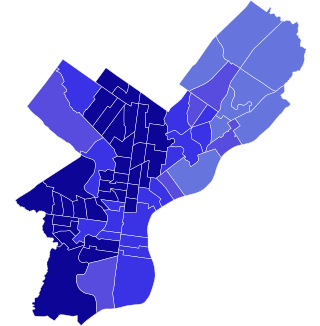
John Franklin Street is an American politician and lawyer who served as the 97th Mayor of the City of Philadelphia. He was first elected to a term beginning on January 3, 2000, and was re-elected to a second term beginning in 2004. He is a Democrat and became mayor after having served 19 years in the Philadelphia City Council, including seven years as its president, before resigning as required under the Philadelphia City Charter in order to run for mayor. He followed Ed Rendell as mayor, assuming the post on January 3, 2000. Street was Philadelphia's second black mayor.

Robert A. Brady is an American politician who served as the U.S. representative for Pennsylvania's 1st congressional district from 1998 to 2019. He was the ranking Democrat and Chairman of the United States House Committee on House Administration from 2007 to 2019. He has served as Chairman of the Philadelphia Democratic Party for more than 35 years and is a registered lobbyist for NBC Universal and Independence Blue Cross.

Michael Anthony Nutter is an American politician who served as the 98th Mayor of Philadelphia from 2008 to 2016. A member of the Democratic Party, he is also a former member of the Philadelphia City Council from the 4th district and had served as the 52nd Ward Democratic Leader until 1990. Nutter also served as the President of the United States Conference of Mayors from 2012 to 2013, and is a former member of the Homeland Security Advisory Council.

Thomas Milton Street Sr. was an American businessman, a Pennsylvania state senator from Philadelphia, and the brother of former Philadelphia mayor John F. Street. Originally a street hot dog vendor, he rose to prominence as an activist challenging the city's vending and housing ordinances.

Alfred W. Taubenberger is an American politician and businessman. A member of the Republican Party, he served as an at-large member of the Philadelphia City Council from 2016 to 2020.

The mayoral election of 2007 in Pittsburgh, Pennsylvania was a special election held on Tuesday, November 6, 2007. The incumbent mayor, Luke Ravenstahl of the Democratic Party faced Republican challenger Mark DeSantis, a telecommunications executive and adjunct professor at Carnegie Mellon University. The race was notable for the strength of its Republican challenger, rare in Pittsburgh, and the election of such a young mayor, Ravenstahl being 27 years old at the time. Ravenstahl was elected with a comfortable margin in an election marked by unusually cold weather but record voter turnout.
The Shame of a City is a 2006 feature-length documentary directed by Tigre Hill about the final month of the 2003 Philadelphia Mayoral Election. During that election, incumbent Democrat John Street sought to defeat his Republican challenger Sam Katz. Philadelphia is predominantly Democratic, but early polls showed Katz with a small lead. Twenty-seven days prior to the election, the FBI revealed that it was investigating Street for corruption, but polls showed that the public supported Street more after the scandal broke. Hill attempts to investigate how Street turned the corruption scandal into an advantage.

The 2011 Philadelphia mayoral election was held on November 8, 2011, to elect the mayor of Philadelphia, Pennsylvania. Incumbent Michael Nutter had been Mayor of Philadelphia since 2008 after being elected in the 2007 election, and was re-elected with approximately 75% of the vote. Primary elections were held on May 17, 2011.

The 2014 Pennsylvania gubernatorial election was held on November 4, 2014, to elect the governor and lieutenant governor of Pennsylvania, concurrently with elections to the United States Senate in other states and elections to the United States House of Representatives and various state and local elections.

The 2015 Philadelphia mayoral election was held on November 3, 2015, to elect the Mayor of Philadelphia, Pennsylvania, concurrently with various other state and local elections. Heavily favored Democratic party candidate Jim Kenney won.

The 1979 Chicago mayoral election was first the primary on February 27, 1979, which was followed by the general on April 3, 1979. The election saw the election of Chicago, Illinois' first female mayor, and the first female mayor of any major American city, Jane M. Byrne. Byrne defeated Republican Wallace Johnson by a landslide 66 percent margin of victory, winning more than 82 percent of the vote. Byrne's 82% of the vote is the most any candidate has received in a Chicago mayoral election.

The 1951 Philadelphia municipal election, held on Tuesday, November 6, was the first election under the city's new charter, which had been approved by the voters in April, and the first Democratic victory in the city in more than a half-century. The positions contested were those of mayor and district attorney, and all seventeen city council seats. There was also a referendum on whether to consolidate the city and county governments. Citywide, the Democrats took majorities of over 100,000 votes, breaking a 67-year Republican hold on city government. Joseph S. Clark Jr. and Richardson Dilworth, two of the main movers for the charter reform, were elected mayor and district attorney, respectively. Led by local party chairman James A. Finnegan, the Democrats also took fourteen of seventeen city council seats, and all of the citywide offices on the ballot. A referendum on city-county consolidation passed by a wide margin. The election marked the beginning of Democratic dominance of Philadelphia city politics, which continues today.

The 1955 Philadelphia municipal election, held on Tuesday, November 8, involved contests for mayor, district attorney, all seventeen city council seats, among other offices. Citywide, the Democrats took majorities of over 130,000 votes, continuing their success from the elections four years earlier. Richardson Dilworth, who had been elected district attorney in 1951, was elected mayor. Victor H. Blanc, a city councilman, was elected district attorney. The Democrats also kept fourteen of seventeen city council seats, losing one district seat while gaining another, and kept control of the other citywide offices. The election represented a further consolidation of control by the Democrats after their citywide victories of four years earlier.

Philadelphia's municipal election of November 3, 1953, was the second held under the city charter of 1951 and represented the first test of the Democratic city government of Mayor Joseph S. Clark Jr. In the 1951 election, the voters had elected a Democratic mayor for the first time in 67 years, breaking the Republican hold on political power in the city. They had also elected a majority-Democratic City Council along with Democrats for district attorney and other citywide offices. In 1953, the voters had the chance to continue the Democratic trend or to block it in the election for City Controller, Register of Wills, and various judges and magistrates. On election day, the Republican organization recovered from their 1951 losses, electing all their candidates citywide. Republicans celebrated the victory, but subsequent Democratic triumphs in the 1955 and 1959 elections made the 1953 result more of an aberration than a true comeback for the once-powerful Philadelphia Republican machine.

The 1963 Philadelphia's municipal election, held on November 5, involved contests for mayor, all seventeen city council seats, and several other executive and judicial offices. The Democrats lost vote share citywide and the Republicans gained one seat in City Council, but the Democratic acting mayor, James Tate, was elected to a full term and his party maintained their hold on the city government. The election was the first decline in the Democrats' share of the vote since they took control of the city government in the 1951 elections, and showed the growing tension between the reformers and ward bosses within their party.

The 2020 United States presidential election in Pennsylvania was held on Tuesday, November 3, 2020, as part of the 2020 United States presidential election in which all 50 states plus the District of Columbia participated. Pennsylvania voters chose electors to represent them in the Electoral College via a popular vote, pitting the Republican Party's nominee, President Donald Trump, and running mate Vice President Mike Pence against Democratic Party nominee, former Vice President Joe Biden, and his running mate California Senator Kamala Harris. Pennsylvania has 20 electoral votes in the Electoral College.

The 1967 Philadelphia mayoral election saw the reelection of James Tate, who narrowly defeated Republican challenger Arlen Specter in the general election. Specter would later be elected to the U.S. Senate in 1980, where he served until 2011.

Elections are currently held every four years to elect the mayor of Hartford, Connecticut.
Elections are held in Evansville, Indiana to elect the city's mayor. Currently, such elections are regularly scheduled to be held every four years, in the year immediately preceding that of United States presidential elections.
Elections are held in South Bend, Indiana, to elect the city's mayor. Such elections are regularly scheduled to be held every four years, in the year immediately preceding that of United States presidential elections.





















